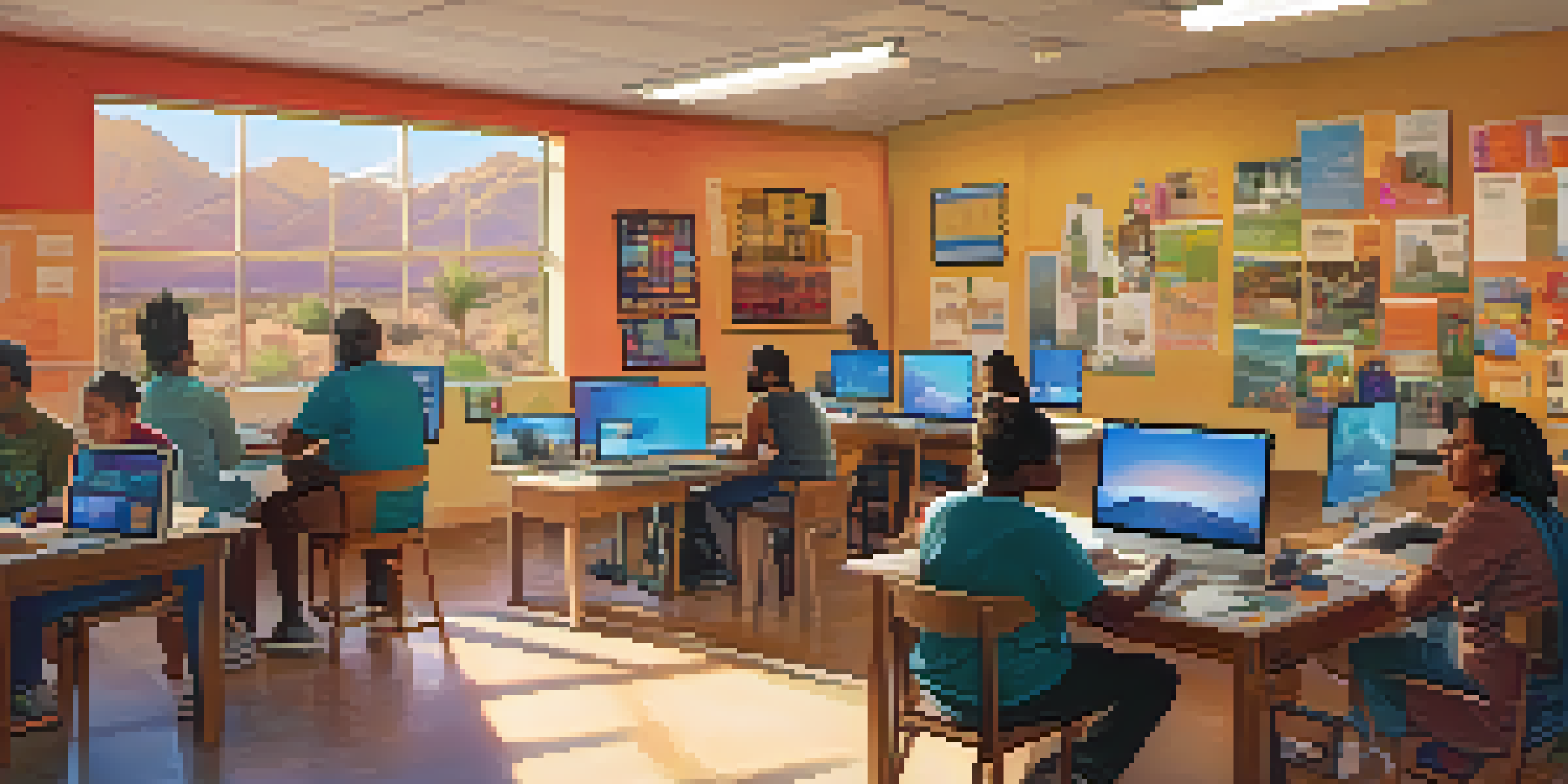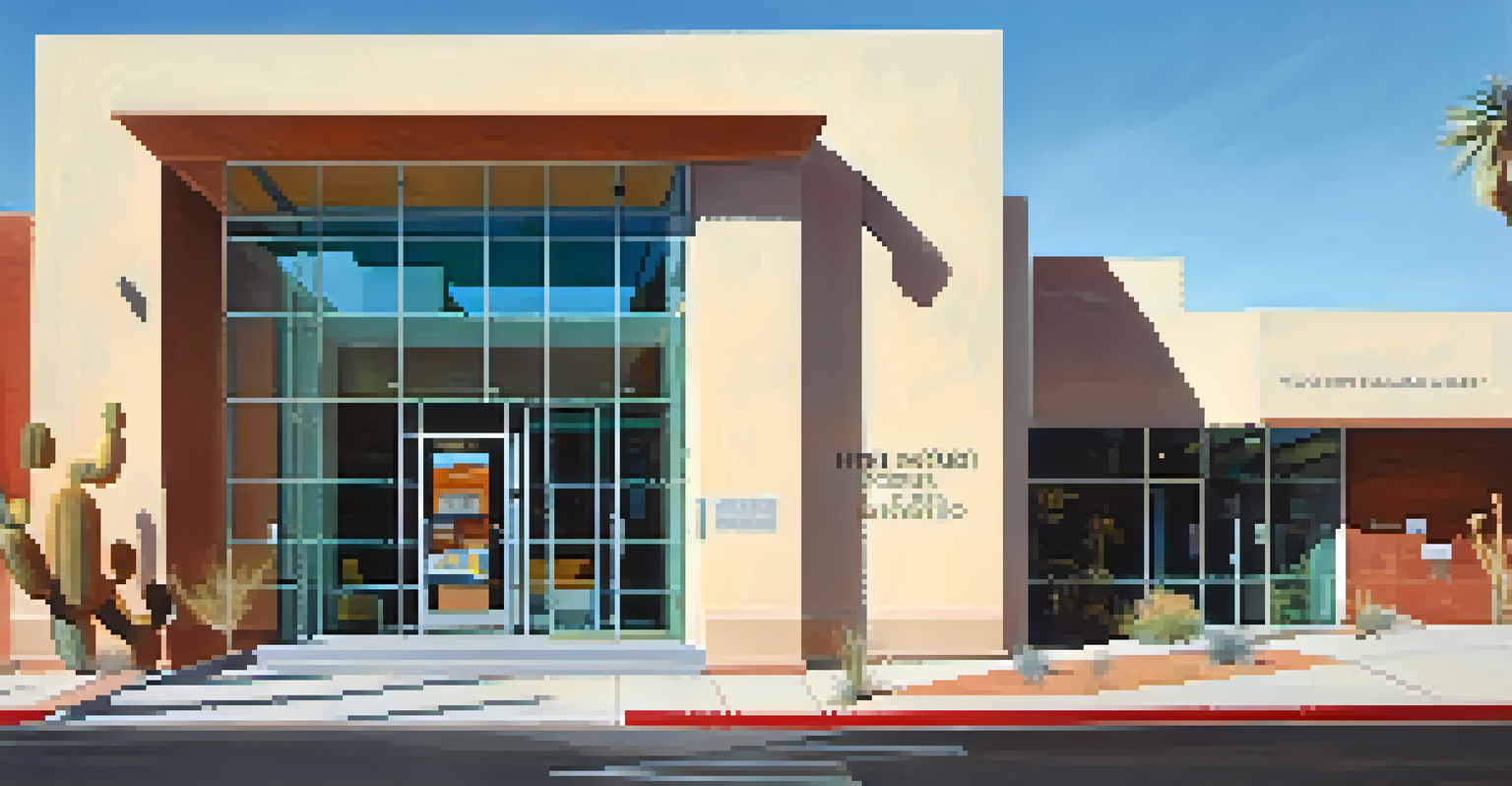Tucson's Community Initiatives for Internet Access

Understanding the Digital Divide in Tucson
The digital divide refers to the gap between those who have easy access to the internet and those who do not. In Tucson, this divide is particularly pronounced in lower-income neighborhoods, where families often struggle to afford reliable internet service. This lack of connectivity can hinder educational opportunities, job searches, and overall quality of life.
The internet is a utility, like water and electricity, and access to it should be a right, not a privilege.
Local surveys have shown that many residents in underserved areas resort to public libraries or community centers to access the internet. However, these resources can be limited in availability and often do not meet the growing demand for online services. As more aspects of daily life move online, the urgency to address this divide becomes increasingly critical.
Community leaders and organizations have recognized the importance of bridging this gap. They are mobilizing resources and expertise to ensure that all Tucson residents have access to high-speed internet, which is essential for economic growth and social equity.
City Initiatives to Improve Internet Access
The City of Tucson has launched several initiatives aimed at increasing internet accessibility across the community. One notable program is the Tucson Digital Inclusion Initiative, which promotes affordable internet solutions for low-income families. This initiative collaborates with local internet service providers to offer discounted plans, making it easier for residents to connect.

Additionally, the city has invested in expanding public Wi-Fi networks in parks and community centers. These efforts ensure that residents can access the internet even without a personal connection at home. By creating more public access points, Tucson is taking significant steps to enhance community connectivity.
Digital Divide Affects Tucson Families
The digital divide in Tucson significantly impacts lower-income neighborhoods, limiting access to essential online resources.
These initiatives are not just about providing internet access—they also focus on digital literacy. Workshops and training sessions are being offered to help residents learn how to use the internet effectively, ensuring that they can take full advantage of the resources available online.
Partnerships with Local Organizations
Community organizations play a vital role in Tucson's efforts to enhance internet access. Partnerships with groups like the Tucson Public Library and local schools help to identify residents in need of support. These organizations provide essential resources and outreach to ensure that no one is left behind in the digital age.
Digital literacy is not just about knowing how to use technology; it’s about knowing how to use it to improve your life.
For example, libraries are not just places to borrow books; they are also hubs for technology training and internet access. Many libraries in Tucson offer free workshops on topics ranging from basic computer skills to advanced online navigation. This educational component is crucial for empowering residents to utilize the internet effectively.
Moreover, local nonprofits are working to connect families with affordable devices, such as laptops and tablets. By addressing both internet access and device availability, these partnerships aim to create a more equitable digital landscape.
Focus on Equity and Inclusion
Equity and inclusion are at the heart of Tucson's internet access initiatives. The city recognizes that marginalized communities often face the greatest barriers to connectivity. Therefore, efforts are being made to ensure that programs are tailored to meet the unique needs of these populations.
For instance, outreach efforts specifically target communities of color and low-income neighborhoods to raise awareness about available resources. By listening to the concerns and challenges faced by these residents, Tucson is working to create solutions that truly serve everyone.
City Initiatives Enhance Connectivity
Tucson's initiatives, such as the Digital Inclusion Initiative, aim to provide affordable internet access and promote digital literacy.
Inclusivity also means considering language barriers. Many programs are being adapted to provide information in multiple languages, ensuring that all residents can access the support they need to connect to the internet.
The Role of Technology Companies
Technology companies have a significant role to play in Tucson's internet access initiatives. Many local businesses are stepping up to provide resources, funding, and expertise to help bridge the digital divide. Their contributions can include offering discounted services, sponsoring community events, and even providing equipment.
For example, some companies have launched programs that donate devices to schools or nonprofit organizations. These initiatives help ensure that students and families have the tools they need to connect to the internet and engage in online learning.
Moreover, tech companies are collaborating with city officials to develop innovative solutions for expanding broadband access. By leveraging their expertise, these organizations can help identify new ways to bring high-speed internet to underserved areas.
Community Feedback and Engagement
Community feedback is crucial for the success of Tucson's internet access initiatives. City officials and organizations are actively seeking input from residents to understand their needs and challenges. This engagement helps to shape programs that are responsive and effective.
Public forums, surveys, and community meetings provide platforms for residents to voice their concerns and suggestions. By involving the community in the decision-making process, Tucson ensures that initiatives are grounded in the real experiences of those they aim to serve.
Community Partnerships Drive Change
Local organizations and tech companies are collaborating to ensure equitable internet access and support for underserved residents.
This approach not only fosters trust but also empowers residents to take an active role in shaping their digital future. When community members feel heard, they are more likely to participate in programs and advocate for their own internet access needs.
Looking Ahead: The Future of Internet Access in Tucson
As Tucson continues to address the digital divide, the future looks promising. Ongoing initiatives and partnerships show a commitment to creating a more connected community. However, the work is far from over, and sustained efforts will be necessary to ensure that progress continues.
Future plans include expanding public Wi-Fi networks even further and enhancing digital literacy training programs. There’s also a push for more funding to support these initiatives, which would allow for a broader reach and deeper impact.

Ultimately, the goal is to create an environment where every Tucson resident has access to reliable internet. This not only benefits individuals but also fosters community growth, economic development, and improved quality of life for all.